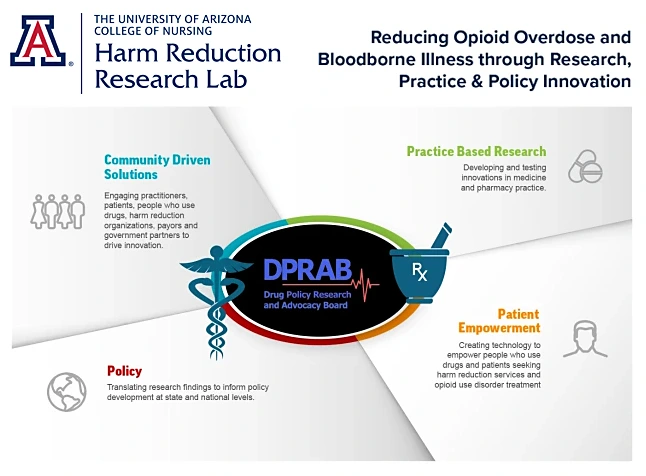
Harm Reduction Research Lab
About the Lab
The Harm Reduction Research Lab (HRRL) was created in 2018 by Dr. Beth Meyerson to reduce opioid overdose deaths, improve opioid use disorder diagnosis and treatment, and reduce bloodborne illnesses such as HIV and hepatitis C. The lab is located in the College of Nursing at the University of Arizona.
The work of this lab is translational to policy and practice, oriented as community-based participatory action research (CBPAR), and grounded in implementation science, to reduce the time between scientific innovation and practice ("bench to bedside").
As the Beverly Benson McCord Endowed Chair in Nursing, Dr. Meyerson and her Harm Reduction Research Lab team seek to understand the unique needs of aging populations at the intersection of pain and opioid use disorder to inform graduate nursing in the care of the elderly – from proper screening and diagnosis to treatment and management of pain and opioid use disorder in a variety of treatment settings. This work is in partnership with the University of Arizona's College of Nursing faculty as well as the faculty of the Comprehensive Center for Pain and Addiction to further research and educate graduate-level nurses and physicians in the care of older adults.

Findings from lab studies have been used to inform state legislative policy in Indiana and Arizona for syringe access decriminalization, administrative policy in Arizona to remove barriers to curative hepatitis C treatment, and policy changes to allow pharmacy dispensing of subsidized naloxone. The lab's work is now informing the practice of treatment for opioid use disorder in both primary care and specialty care settings.
Faculty members of the Harm Reduction Research Lab hail from eight universities throughout the U.S. Together, they conduct research with guidance from an Arizona transdisciplinary group of people, the Drug Policy Research and Advocacy Board (DPRAB).
What is Harm Reduction?
The Harm Reduction Research Lab is about understanding harm through the eyes of those who experience it, and seeking innovative solutions with them that will achieve systemic change.

